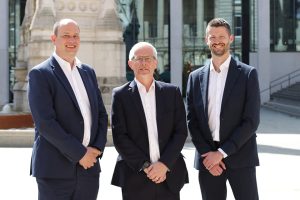‘Talking Business’ with Stephen Hunt of LaSer UK

|
In the first of a new series of ‘Talking Business’ interviews, Stephen Hunt, COMMENTReinvent yourself, then reinvent your businessThe lifecycle for any business is fraught with tension lines. The skills that underpin a successful start up, for example, are very different to the skills that drive an established, mature business. While these skills are well documented, central to growing a business is the ability to spot when a change in approach is right for a particular business. Why is this? Well, the answer is quite straightforward. For any of us in business, the simple fact is the skills that got you to where you are now are most unlikely to be sufficient to get you (and your business) to where you need to go next. Add to this end standing still is not an option and this compounds the leadership challenge. From my experience, successful businesses that go from strength to strength (in good economic times and bad), are led by individuals who are personally committed to self reinvention. This for most people is a scary activity but one that is at the heart of what is typically described as ‘a culture of innovation’. This is clearly a very personal activity and focuses on you. Leaders need to be asking themselves questions such as what personal development have I done that has resulted in making me more valuable to the business and what have I done to help contribute to the improved effectiveness of others? What you may find slightly surprising is that so far I have made no reference to corporate strategy, macroeconomic, geopolitical events and the like. Well, from my experience, business leaders who start with innovating themselves are best placed to work with others to innovate their business and those around them. If you are not already doing so I strongly recommend a walk into the scary zone of self reinvention – it can be fun! Steve Hollis, regional chairman, KPMG
|
How can a long-serving company man revolutionise an organisation?
“WE’RE a bit grumpy. We’re never satisfied.” Coming halfway through a pleasant conversation over lunch with one of the most quietly spoken and amiable business people in the region, this statement came as a bit of a shock. It was made by Stephen Hunt, chief executive of LaSer UK, the credit management business based in Solihull, which, like its leader, is softly spoken, but exudes a quiet confidence in its rapid recent growth. Grumpy he certainly isn’t, but in the context of constantly seeking the next improvement, the next opportunity, there’s a controlled impatience in the way Hunt steers LaSer towards its next ambitious growth targets.
An intriguing story, then, to be told at the first ‘Talking Business’ lunch hosted by TheBusinessDesk.com and KPMG, whose regional chairman Steve Hollis joined the conversation. So what is it that makes Hunt and his team grumpy? “We don’t just want to be satisfied with doubling the size of the business over the past three years. We’re constantly looking for the next opportunity. Even through the hard times of three years ago, our parent group was investing, and we were setting ourselves some challenging targets.” Hunt’s journey to the top seat at LaSer UK started when he became the group’s financial controller in 1992. Rising through the ranks, he took the helm in the same year as the words ‘Lehman Brothers’ and ‘credit crunch’ entered the national consciousness. But those early days in charge weren’t characterised by a hunkering down to ride out the storm, but neither was it a period of crisis-induced clearouts of people and processes. So who in their right mind would have taken over a credit business tied to the retail industry in 2008 – the epicentre of the credit crunch and starting point for the deepest recession for decades?  Hunt said: “We’re very fortunate in that the business – despite all the turmoil – remained an energetic place to be, and continued to grow all through that period. “Having been in the business for so long, I understood what a fantastic opportunity it was. Over the previous two or three years we’d been putting in place lots of good things, and if we could keep focussed on what was really important – controlling risk and costs and focusing on profit, we could bring everything together to take advantage of that very tought market – and that’s what we did.” His optimistic outlook continues: “There are so many opportunities for us at the moment. I haven’t seen so many in 20 years in the business, because there is such a momentum behind what we’re doing. Even when we’ve seen retailers going out of business and competitors closing, our people have kept driving forward.” LaSer UK’s origins are as Selfridges Finance, moving to Midlands in the 1970s, to a base at the Swan in Yardley. Twenty years ago, it was a well known local employer, but after a period of outsourcing, the brand ‘fell under the radar’ says Hunt. “It’s only over the past four years or so that we’ve been pulling the call centre function back in that we’ve suddenly become a business of 500 people.” The reunification of separate strands of the business is a trademark of Hunt’s leadership.
“When I took over we had in effect four overlapping cultures so we had to do a lot of work on our people strategy and do a lot more to engage with our employees. I stressed to my management team that the reason I’d stayed for 20 years was because I enjoyed coming to work – and I want everybody to feel that way.” Hunt is a rare example of a long-standing employee who has risen to the top job and effected real radical change, when the more usual model is of a new broom being brought in by a board convinced that only an outsider and a new management team can give the organisation the fresh start it needs. How has he managed to create such a fresh start after 20 years in a senior role in the business – while keeping the existing management team in place? “First of all I recognise all of that – and so did my management team,” he says. “What we needed to do was really challenge ourselves, to look externally for inspiration and to get outside of the business. We basically challenge ourselves to be the very best at what we do. “I’ve seen lots of examples where people try to bring about a revolution, to change a business in 90 days, come up with action plans and the like. “But I suppose what I had was an understanding that came from being in the business for a long time and also understood some of the things that needed to change, from listening to people in the business about what we needed to do. I took it as my personal challenge to respond to accusations that having been in the business for a long time, I must be ‘part of the problem’. My response was to make sure that things did change, that we did act differently and as a management team we were leading from the front.” Steve Hollis, who’s seen the inner workings of many Midlands boardrooms in his time, said: “I think it helps having such a stable shareholder base, but if you’ve shareholders looking for immediate change and actions, chief execs are very often put into the position of having to go out and fire various members of the management team to provide quick evidence of ‘action’.” Hunt added: “We’ve been very lucky, we’ve had some fantastic shareholders. In the 12 years that the Laser group has owned us, we’ve been through some challenging times, but they’ve always taken a very pragmatic view because they could see the opportunities in the UK market and the strengths in the business.” SectorsCommentsIf you'd like to leave a comment, please register now for free or login
|




 He took the reins three years ago, and immediately set out his stall to double turnover in three years. He did it, and now the company that provides customer loyalty solutions to businesses as diverse as Currys and DFS finances more than £1bn in credit annually.
He took the reins three years ago, and immediately set out his stall to double turnover in three years. He did it, and now the company that provides customer loyalty solutions to businesses as diverse as Currys and DFS finances more than £1bn in credit annually.  “I was really keen to ensure that all of the business came back together in one place, so that we could in particular re-engage with the end customer.
“I was really keen to ensure that all of the business came back together in one place, so that we could in particular re-engage with the end customer.






